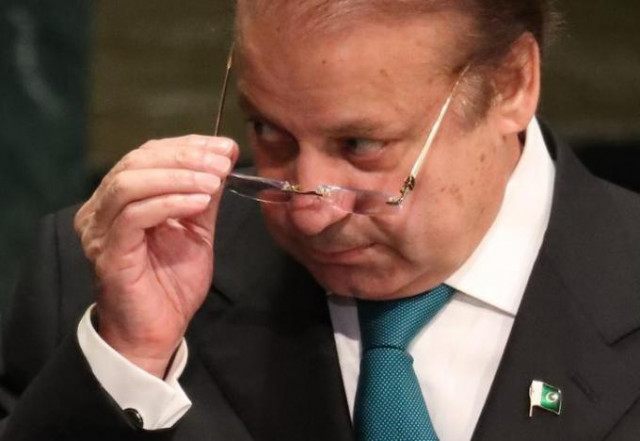Sadiq & Ameen: PM’s attorney picks holes in disqualification law
Cites Justice Khosa’s own remarks calling Articles 62 and 63 a ‘feast of legal obscurity’

Prime Minister Nawaz Sharrif. PHOTO: REUTERS
Makhdoom Ali Khan, the attorney for Nawaz Sharif, argued before a five-judge larger bench, headed by Justice Asif Saeed Khosa, that the top court cannot ‘directly’ disqualify his client by invoking Article 62 (1) (f) of the Constitution.
“There is a need for a declaration before disqualifying any member of parliament,” he said, adding that disqualification could not take place simultaneously.
He referred to the case of former military ruler Pervez Musharraf in which a returning officer and subsequently the Sindh High Court had disqualified Musharraf from becoming a member of parliament on the basis of the Supreme Court’s July 31, 2009 judgment.
The verdict stated that Musharraf had violated his oath by declaring a state of emergency and issuing a provisional constitutional order on November 3, 2007. Here, Justice Ijaz Afzal Khan told Sharif’s counsel that he had ‘collapsed’ his argument after citing Musharraf’s case
Khan said Premier Sharif’s speeches cannot form the basis for removing him from the office under Article 62 (1) (f) of the Constitution. The Article requires that a person be sagacious, righteous, non-profligate, honest and Ameen (trustworthy), there being no declaration to the contrary by a court of law.
He also referred to the judgments of two members of the five-judge larger bench regarding the adjudication of disqualification under Article 62 (1) (f).

Justice Ijaz ul Ahsan while heading a bench of the Lahore High Court in the Gohar Nawaz Sindhu case had held that before one could be disqualified for making a false statement it must be established that in what background and context the statement had been made and such a factual inquiry could not ordinarily be undertaken while exercising extraordinary jurisdiction. The same judgment had also been upheld by a seven-judge larger bench of the apex court in the Ishaq Khawani case
Khan also referred to the Supreme Court’s 2014 judgment in the Ishaq Khakwani case in which a former chief justice, Jawwad Khawaja, had held that before one can disqualify anyone under this [Sadiq and Ameen] provision it must be established that which court is competent to determine that and what is the criteria and standard of proof to unseat a member of parliament. “In this case, this has not been done and there are no ground rules available for this determination,” he added.
Khan also read out an additional note, authored by Justice Khosa, in the Ishaq Khakwani case wherein he had reproduced his 30-year-old article which described Article 62 (1) (f) as a “nightmare for lawyers and a feast of obscurity”.
Khan said Justice Khosa had observed that the vague, uncertain, obscure and conflicting terminology used in different provisions of Articles 62 and 63 might be a result of bad draftsmanship of ignorance of the requirement of exactitude so essential to all legal and constitutional instruments yet and it stands, it is bound to confuse the electorate at large, hound the candidates and their voters and embarrass the ROs at the time of scrutiny of the nomination papers, confound the election tribunal and become a nightmare for lawyers and the courts in years to come.
In the additional note, Justice Khosa had also observed that there was disconnect between the constitutional morality and political ethos. “There are no qualms of conscience when through a constitutional and legal process a person is ousted from an elected chamber on account of his academic degree being fake and forged but is returned by the electorate to the same chamber with a bigger majority.”
Khan stated that Justice Khosa in a very learned and articulate opinion had identified the obscurities and anomalies in this provision and identified the dangers of disqualifying any elected member of parliament on that basis.
He said the provision was ‘crying out’ for amendment. “The prime minister cannot be judged by a different standard. He cannot be disqualified on the basis of a provision which Justice Khosa has called a nightmare and a feast of legal obscurity,” Khan added.
The hearing was adjourned until Monday.
Meanwhile, Shahid Hamid, the counsel for Premier Sharif’s son-in-law Captain Safdar and Finance Minister Ishaq Dar, submitted replies on behalf of his clients. Captain Safdar stated that he has been paying taxes from the day he was an army officer while Dar submitted that all the allegations against him of making a ‘confessional statement’ have already been quashed by the Lahore High Court.
PTI chief media talk
PTI Chairman Imran Khan has claimed that Premier Sharif is trying to escape the Panamagate case as he doesn’t have anything to prove his innocence. “Nawaz Sharif is accountable to the nation. In a democracy, every leader is accountable to people,” he told journalists outside the Supreme Court after the hearing.
Imran said surprisingly Sharif didn’t even know that his children have become billionaires. “They have accepted the ownership of the London apartments, and now it’s their duty to provide the money trail in the court,” he said.
He said the Sharif family was hiding behind technicalities. “Today, they have admitted that they have no evidence of any business money trail. Now, they say Articles 62 and 63 are not applicable on the prime minister,” he said.
Published in The Express Tribune, January 14th, 2017.



















COMMENTS
Comments are moderated and generally will be posted if they are on-topic and not abusive.
For more information, please see our Comments FAQ